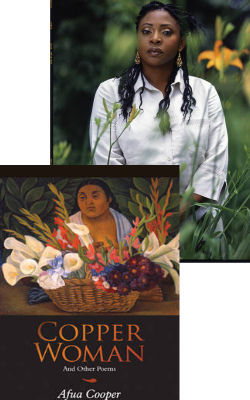|
|
 |
Fresh from her still unfinished cross-Canada book tour for her much-acclaimed The Hanging of Angélique, the beloved Toronto-based professor of history and dub poet Afua Cooper recently stopped by the Arbour Room of UofT’s Hart House to chat with AfroToronto.com. It was the day of the World Cup match between England and Sweden. Very conscious of her people’s history and its tortured relationship with England, Dr. Cooper made it clear amongst the room’s over-capacity crowd of England supporters that she wished that Her Majesty’s men get beat by the Swedes. The three lions kept roaring on that day, but as we sat down to talk about her new book of poetry, Copper Woman, it was evident that Afua Cooper’s sense of history never leaves her.
She tells AfroToronto.com: “My poetry voice is a different voice and distinct voice from my scholarly or academic work. It is different. I find that as an individual and a creative person, I have many voices. It’s not just two or one. As a poet, there are many voices that come through me.”
In one of her poems from Copper Woman, she tells us about Phillis Wheatley, the first Black person in North America to write a book. She gives voice to her struggle as a frightened eight-year-old girl lost in the new world where the names of her ancestors no longer meant anything. Afua Cooper also uses the power of poetic verses in “Negro Cemeteries” to pay homage to the souls buried in Old Durham Road Negro Pioneer Cemetery near Princeville, Ontario and other places in Canada. While doing her academic research in history, Dr Cooper says that poetry is the one thing that always relaxes her. It’s a form of expression that she always comes back to. Her poems from Copper Woman were written over a ten-year period. It was constantly in the works alongside her academic historiography work. But as she acknowledges: “I find though that I can’t do both at the same time. .... If I’m immersed in a particular piece of writing or a particular genre, I have to deal with that. … I might do both things the same week but not at the same time.”
Nonetheless, Professor Cooper wished she had more liberty within the confines of the university system’s rigid academic disciplinary boundaries to engage her students with her history-inspired poetry. “I don’t teach poetry at all. I teach history. Here, you know, there are these disciplinary boundaries. If you’re in history, you’re in history. If you’re in sociology, you’re in sociology. If you’re in English literature, you stay there. … That’s kind of how they work.” Ideally, however, Afua Cooper would love to work in a more ecumenical environment where genuine cross-disciplinary studies are welcome. “So if you have a course like the African diaspora, that’s a great course for interdisciplinary stuff, right? There’s literature, political science, and history and art, music. That’s something I’d like to do, but I’d have to establish my own college,” she bemoans.
So where did the title of her new book of poetry, Copper Woman, come from? Afua Cooper tells Afrotoronto.com that the title comes from her upbringing in Jamaica, where she was surrounded by older women around her who wore copper bracelets. She recounts: “As a little girl, I was always fascinated by these women wearing tons of copper bounds around their arms. Also, [copper is] the metal of the goddess of love throughout the world. Copper is associated with Venus and with Oshun, the Nigerian/Caribbean love goddess.” Copper invokes many things for Afua Cooper. “In terms of feeling, it invokes love, my skin colour, the skin colour of Black people in general; it invokes red for passion and death and life and blood and all those things.”
The theme of blood and continuity of heritage is a common theme found amongst a vibrant group of Toronto-based dub poets, which Afua Cooper belongs to, and is called the Dub Poets Collective. Founded in 2003, the organization is dedicated to promoting dub poetry as a vital cultural practice. The DPC members include Lilian Allen, Afua Cooper, D’bi Young, Chet Singh, Clifton Joseph, Klyde Broox and Sankofa Juba. For the book launch event of Copper Woman, held on June 22nd at the Lula Lounge, Afua Cooper felt that it was important to have her fellow members of Toronto’s spoken word community be part of her book launch. “We don’t do things by ourselves. … This is about sharing, and this is about a celebration. All these poets are great poets”, according to Dr Cooper. The event was hosted by Clifton Joseph and featured poets heronJones, Strong, Mel White, Peculiar I and drummer Greg Roy. The on-stage poetry was beautifully accompanied by live music by the Dub Trinity band. Afua Cooper, like all dub poets, has always had a history of performing with drums and music. “ It’s not music and poetry; it’s a mélange. It is both. The music expands the poetry.”
Dr Cooper’s entire life has been shaped by dub poetry. From spending years around Jamaican dub poetry pioneers as a teenager to becoming immersed in Toronto’s poetry scene in the 1980s, dub poetry is a central part of both her artistic and political souls. “It was a natural thing for me because, you see, dub poetry in Jamaica came out of reggae music culture. That’s the culture it came out of. Which is political. It deals with a lot of politics and socio-economic issues. There’s no way from that. But of course dub poetry covers life, it covers everything. You will find a political sensibility in dub poetry, which you probably will not find in other poetry streams. The whole matter of social justice is at the heart of dub poetry,” says Afua Cooper.

